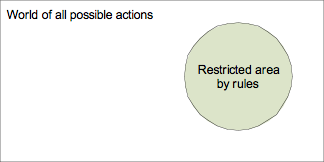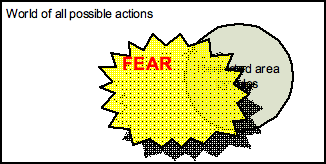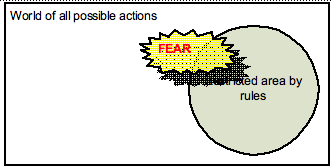The Liberty of Rules
This column has been inspired by the fact that my company, named 'LibRT' celebrates its 10th anniversary in September 2008. The name of our company is actually not related to rules, it is related to liberty and the fact that the company grants its owners great freedom of action to create great products and services.
Rules are not immediately associated with liberty. Instead they are thought of as a way to restrict or suppress us; they have a negative connotation. Dealing with rules for more than 10 years now, I never had the feeling that we were trying to restrict and suppress. To the contrary, I always had the feeling that I was creating more freedom! In trying to explain this paradox, I gave the relationship between liberty and rules a second thought.
SBVR defines a rule as a restriction of freedom. This means that everything is allowed unless there is a rule that makes a restriction. Theoretically this means that a rule makes the world of all possible actions smaller, as depicted in Figure A.

Figure A
But in a concrete world the set of all possible actions is restricted by practical considerations. For example, 'fear' may limit the use of all possible actions to a smaller subset, as depicted in Figure B.

Figure B
Now suppose that we create a rule that takes away the 'fear' that restricted the set of possible actions. The result is that the introduction of the rule now creates more actions, thus more freedom.

Figure C
The rule that "it is forbidden to kill a fellow human being" is an example of a rule that creates freedom for many people by taking away fear for other people's behaviour.
This observation of how rules can create more freedom actually comes much closer to what I experience in helping organizations to organize their rules. Inconsistent, incomplete, and vague rules create a chaos in organizations and distrust by the customers of those organizations. Chaos and distrust result in fear that actually restricts the behavior of people. By organizing the rules — perhaps creating new rules — and expressing them right, this restriction is taken away, resulting in more freedom.
# # #
About our Contributor:
Online Interactive Training Series
In response to a great many requests, Business Rule Solutions now offers at-a-distance learning options. No travel, no backlogs, no hassles. Same great instructors, but with schedules, content and pricing designed to meet the special needs of busy professionals.










How to Define Business Terms in Plain English: A Primer
How to Use DecisionSpeak™ and Question Charts (Q-Charts™)
Decision Tables - A Primer: How to Use TableSpeak™
Tabulation of Lists in RuleSpeak®: A Primer - Using "The Following" Clause
Business Agility Manifesto
Business Rules Manifesto
Business Motivation Model
Decision Vocabulary
[Download]
[Download]
Semantics of Business Vocabulary and Business Rules